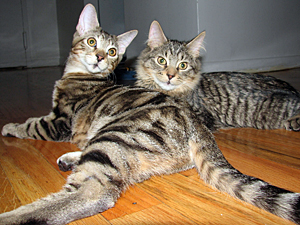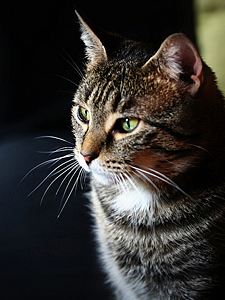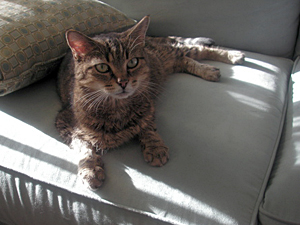
Wobbly-bobbly siblings Oliver and Elliott found their new home through KittyKind's Extra Special Cats program.
Special Maddie's Fund® Grant Gives KittyKind's Extra Special Cats a Leg Up on Adoption
Oliver and Elliott are two of KittyKind's extra special kittens who finally got their day in the sun. The four-month-old siblings are an active and affectionate pair. The only thing is, they wobble. And bobble. And they sometimes fall down.
The boys have a condition called cerebellar hypoplasia, caused when the brain's cerebellum is not fully mature at birth. It often results in jerky movements and uncoordinated motion. Typically, wobbly-bobbly cats are healthy, active cats who simply require some accommodation by their family.
Oliver and Elliott were recently adopted by Ryan, who is delighted to have the boys share his home. "They are adorable," he says. "Not only are these cats truly extra special, but in opening your heart and home to a CH kitty, you get extra special satisfaction and love in return."
Oliver and Elliott aren't the only "extra special" kitties to find their new home through KittyKind. In fact, there are plenty of "extra special" cats and kittens awaiting loving homes through the group's adoption center at PETCO - Union Square (860 Broadway at 17th Street). And fortunately, these cats are getting a better chance of being adopted as a result of KittyKind's Extra Special Cats program. By the group's definition, any cat with impaired vision, mobility, or neurological issues, or is elderly, diabetic, FIV- or FELV-positive, or semi-feral, is considered "extra special" and therefore benefits from the high visibility and special promotional support offered by the organization.
Still awaiting her forever home is Opal, a six-year-old petite tabby. Opal has come so far, and is eagerly awaiting her forever home with a special person.
Earlier this year, the program received a tremendous boost in the form of a $25,000 grant from Maddie's Fund to support the fostering and placement of extra special cats into safe and loving homes. Nearly 200 rescue groups, traditional shelters, animal control agencies, and adoption guarantee shelters across the country vied for grants in the Maddie's Fund/Petfinder.com marketing competition. Entrants were judged on their programs' effectiveness in finding homes for seniors, disfigured, blind, deaf, unattractive and shy pets, as well as dogs and cats with medical or behavioral problems. Entries were judged on the basis of the quality of the submission, the marketing idea and its implementation, the number of animals placed, documentation of results, size and sophistication of the organization, and resources available in the community.
Because of the quality and quantity of entries, Maddie's Fund tripled the award, to $300,000 over the originally announced sum of $100,000. In addition to the top grant award of $25,000 each to KittyKind and Senior Dog Rescue of Oregon, three organizations received $15,000 each, three received $10,000 each, and more than 100 other organizations each received between $500 and $5,000 in prize money.
"We wanted to offer as much support and encouragement as possible for the many great ideas we received," said Maddie's Fund President Rich Avanzino. "These organizations have demonstrated that a significant market does exist for disadvantaged animals. In fact, many pet lovers are particularly touched by the plight of difficult-to-place dogs and cats and are eager to shower them with love and a new forever home."
Kathleen Goward, the volunteer who wrote KittyKind's grant submission, emphasized that the organization's "heartfelt belief is that each and every one of these cats deserves its own home and the dedicated love and affection that comes with it."

Lily (formerly Odetta) is a beautiful tabby with tons of personality who, though having tested positive for FeLV, was positively irresistible to her adopters. "She is really the sweetest cat I've ever known. We are thrilled to adopt such a special cat from you, and she seems right at home."
KittyKind's approach toward hard-to-place cats begins with terminology. "We make a point of not referring to our cats with disabilities as 'special needs cats,' as this implies a negative added burden of care," explained Kathleen. "Instead, we coined the phrase 'Extra Special' to evoke the sense that you get something positive and special from these cats. The term 'Extra Special' communicates the idea that cats with disabilities compensate by giving much more back to their caregivers."
The group's "Extra Special" cats are showcased at their adoption center at PETCO - Union Square, on their website at www.KittyKind.org, and other online venues. In February, as part of "I Love NYC Pets" month, KittyKind featured two weekends of "Extra Special" cats for adoption. As a result, three cats with cerebellar hypoplasia (including Oliver and Elliott) and an FELV-positive cat were adopted. Subsequent "Extra Special" events in March and April attracted adopters for a dozen more extra special cats, and more events are being planned. One such event that is achieving excellent results is "Seniors for Seniors" day, which offers a special opportunity for seniors (or anyone interested in adopting a calm senior cat) to meet some of KittyKind's senior cats and talk with seniors who have adopted or fostered senior cats. These efforts have thus far resulted in four senior cats between the ages of 10 and 16 years being adopted. Three of those seniors were featured on NY1 television, which, along with other media, has taken an interest in KittyKind's "Extra Special" adoption events and is providing repeated coverage.
Representatives of KittyKind say they are delighted to have been awarded the Maddie's Fund grant to assist in their work with Extra Special Cats. According to Miriam Hibel, KittyKind Adoption Representative and Foster Care Coordinator, "Our all-volunteer organization has a proud tradition of welcoming cats of all 'stripes,' and although our resources are limited and we cannot, unfortunately, take in all the cats who so desperately need sanctuary, love, and care, we believe that every cat deserves an opportunity to find his or her forever home. The grant enables us to devote more money and effort to rescuing, healing, and adopting cats who would otherwise be ignored, unable to survive in the streets, or euthanized at city shelters. So, too, the grant supports our commitment to raising awareness of these special cats, with events like our 'Extra Special Cats' and 'Seniors for Seniors' adoption weekends."
For information about all the wonderful extra special cats available for adoption from KittyKind, or to find out when the group's next "Extra Special" adoption event is scheduled, visit KittyKind's website at www.KittyKind.org.
To read more about cerebellar hypoplasia, go to www.chkittyclub.com.







